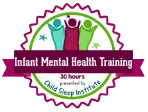Whoever invented the phrase “sleep like a baby” may not have been a parent. If you’ve got a child between the ages of 4 and 12 months, you know that their sleep routines aren’t always, well, routine. That’s because there are many different factors that influence a baby’s sleep habits during this crucial developmental period in their lives.
This is a time when a baby’s brain is growing and changing, and one of the many things the brain is doing is organizing sleeping and waking cycles. It’s not uncommon for your little one’s sleep needs to be shifting, especially near the 1-year-old birthday: The National Sleep Foundation (NSF) recommends 12 to 15 hours of sleep in a 24-hour period for babies ages 4 to 11 months, while that range decreases to 11 to 14 hours for toddlers ages 1 to 2. Nap times are also shifting; for instance, babies ages 4 to 5 months may nap anywhere from 20 minutes to two hours, and can take between 3 and 5 naps a day.
Perhaps the biggest factors affecting your baby’s sleep are the developmental milestones and major lifestyle shifts, called world view changes, that babies experience during this 4- to 12-month-old timeframe. These can result in sleep “regressions,” but they are really “progressions” for your child’s development.
Sleep is disrupted during developmental milestones and world view changes because babies spend more time in active Rapid Eye Movement (REM) sleep. According to researcher Nathaniel Kleitman , “REM dreaming allows us to process daytime emotional experiences and transfer recent memories into longer-term storage.” Non-REM sleep, on the other hand, allows the mind and body to rest and recharge. And there are plenty of milestones and changes for babies at this age. Developmentally, they will begin rolling over, sitting up unassisted, crawling, standing, and walking. World view changes can include parents going back to work, getting used to new caregivers, or travel that interrupts normal schedules.
So how can your baby (and you) get a good night’s sleep with all of these changes? Here are some strategies (some of which are Quick-start Steps from my book “Loved to Sleep”) that your family can implement to get everyone the sleep they need.
Be Mindful of Daytime Sleep
Night sleep can be affected by the number of daytime naps, and how long your baby sleeps during each of them. But don’t think that skipping naps will make your baby tired enough to sleep soundly at night. The frequency and occurrence of daytime sleep can affect the number of night awakenings and create early rising patterns.
You can use the 12-hour clock to schedule naps for your little one, but the real magic happens when you focus on how long your little one is awake between naps, and especially between the last nap and bedtime. Babies who are awake too long get a jolt of cortisol in their system, which triggers a “second wind.” Once the cortisol level has lowered, you get a second chance to put your child to sleep. There is a direct correlation between spending too much time awake before bedtime and an increase in night awakenings.
Make Sure Baby Gets Enough Sleep
Just like you put fuel in your car’s gas tank, you want to keep your baby’s “sleep tank” full, too, making sure there’s adequate sleep over 24 hours. Even 20 minutes more a day can make a difference. Here’s a good rule of thumb for nap times:
- Ages 4 to 5 months: 3 to 4 naps, with 90 minutes of wakefulness between naps
- Ages 6 to 8 months: 3 naps, with 1 ½ to 2 hours of wakefulness
- Ages 9 to 12 months: 2 naps, with 2 to 3 hours of wakefulness for ages 9 to 10 months, or 3 to 4 hours for ages 11 to 12 months
Get in a Groove
Bedtime routines can be soothing for your baby, and be the cue that it’s time to sleep. Your routine can include a bath, massage, or reading, but make sure to do the activities in the same order each night. Also, consider how you comfort your baby when he wakes up at night. Do you feed him, rock him to sleep or walk around the room with him? This is your Base Technique, and it’s the starting point to encourage better sleep habits and long-term sleep goals.
Bedtime is the Right Time to Sleep Train
When you start sleep training with your baby, begin at bedtime; the rest of the night, do whatever works for your family to get through the remainder of the night in the short term. Remember, it will help reduce bedtime fussiness if your baby gets enough sleep in a 24-hour time period.
Baby Steps are Great
At bedtime, you want to take a small step towards your sleep goals; I call this a Sleep Shift. This isn’t a drastic change that could be upsetting to your little one, but a gentle nudge in the right direction towards sleep. Let’s say your baby typically feeds until falling asleep. A Sleep Shift would be feeding him just until he is drowsy, and then rocking him to sleep. Remember, you and your baby are working together on this goal, so keep a positive mindset. Say to your child (and yourself), “Little one, I am here with you and we can do this together.” Within the next few days, help your baby fall asleep while implementing a new association with sleep. Soon you’ll be ready for the next Sleep Shift.
Be Flexible
To handle fussiness, switch back and forth between the Base Technique and the Sleep Shift. Take the Sleep Shift example above: If the baby cries, you can nurse him until he is calm and then remove him from the breast and return to rocking to sleep. Repeat as often as needed until you can finally rock your baby to sleep.
Good Sleep Can Take Time
It’s exciting to see your little one adapt to a new Sleep Shift, but be patient when introducing another one. It can take babies a few days to a week to learn a new sleep skill..
Ask for Help If You Need It
If you’re having trouble with forming new sleep habits, there could be another cause at work. You may want to talk with your pediatrician if your baby snores loudly and persistently or sleeps less than 9 hours in a 24-hour period; it can also be helpful to seek advice if you are considering night weaning.
Right now, your baby is in one of the most amazing growth periods of his life. Good sleep is so important for your little one’s growth—and for your whole family’s well-being. It may seem like sound sleep is hard to get during this time, but hang in there. You and your baby can do it!





Comments are closed.